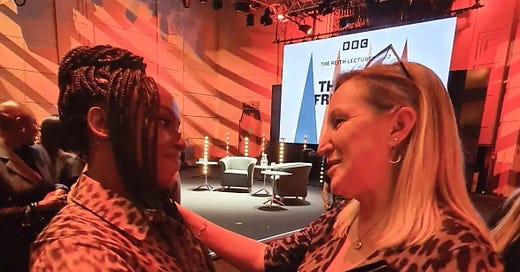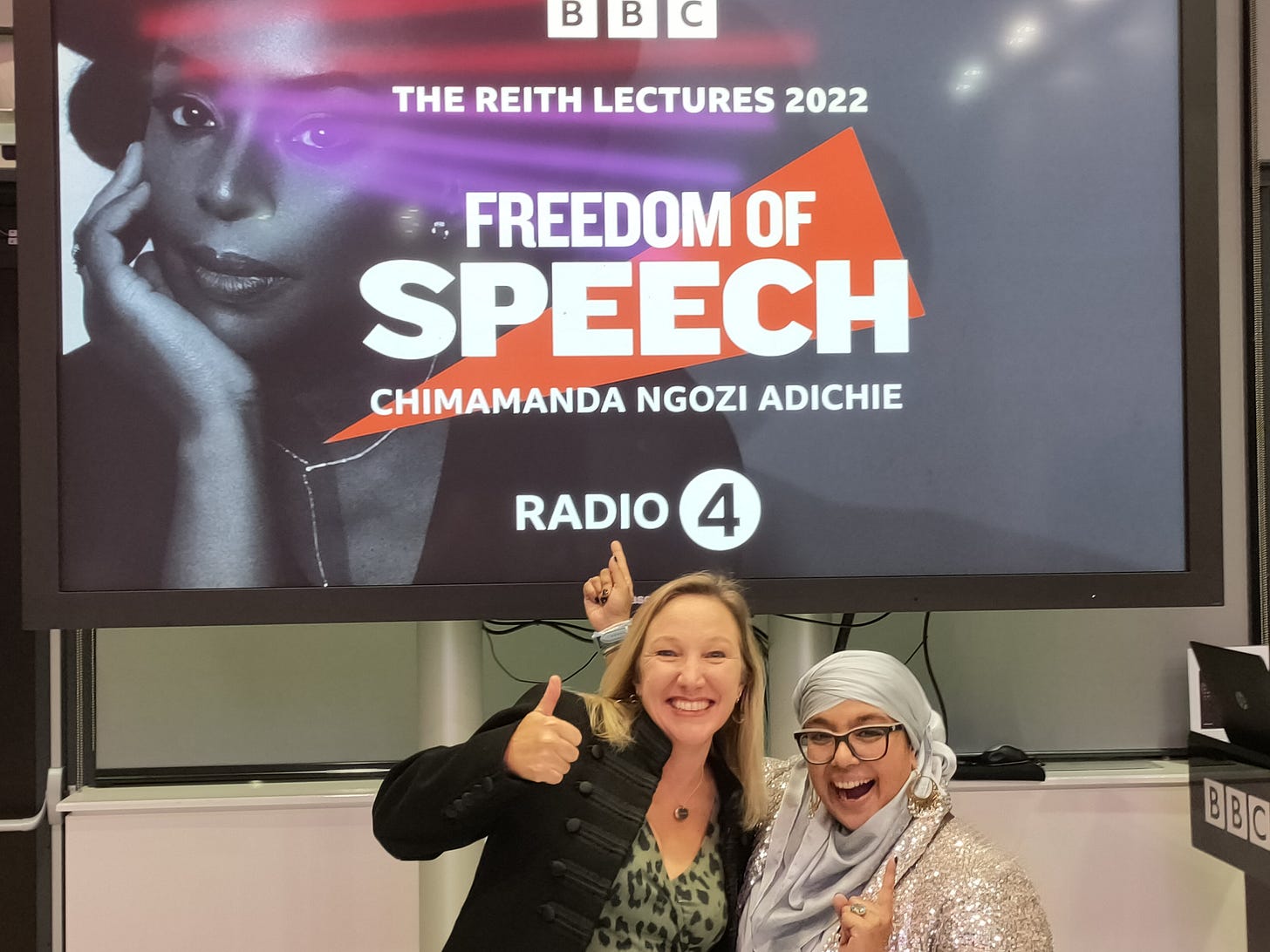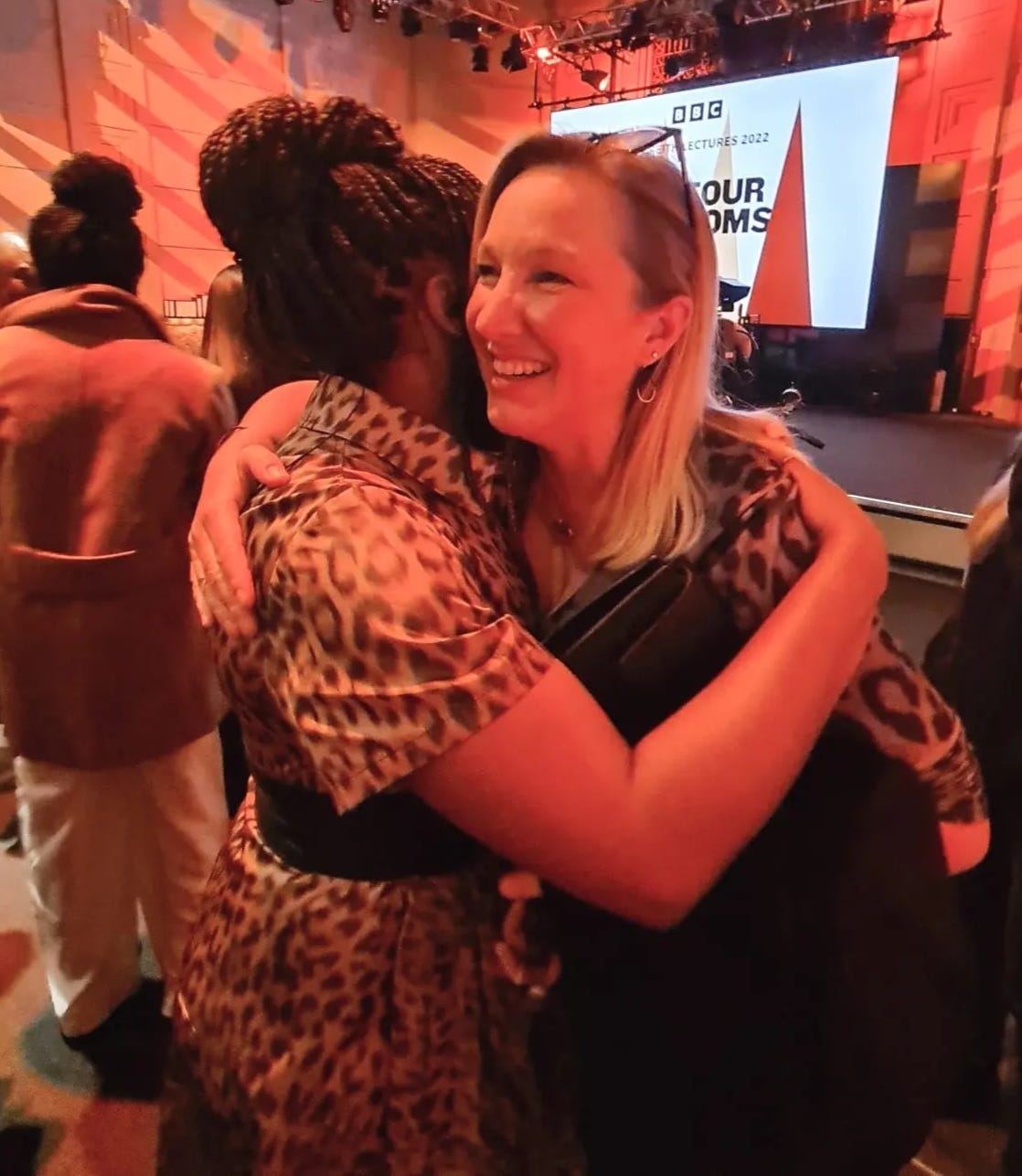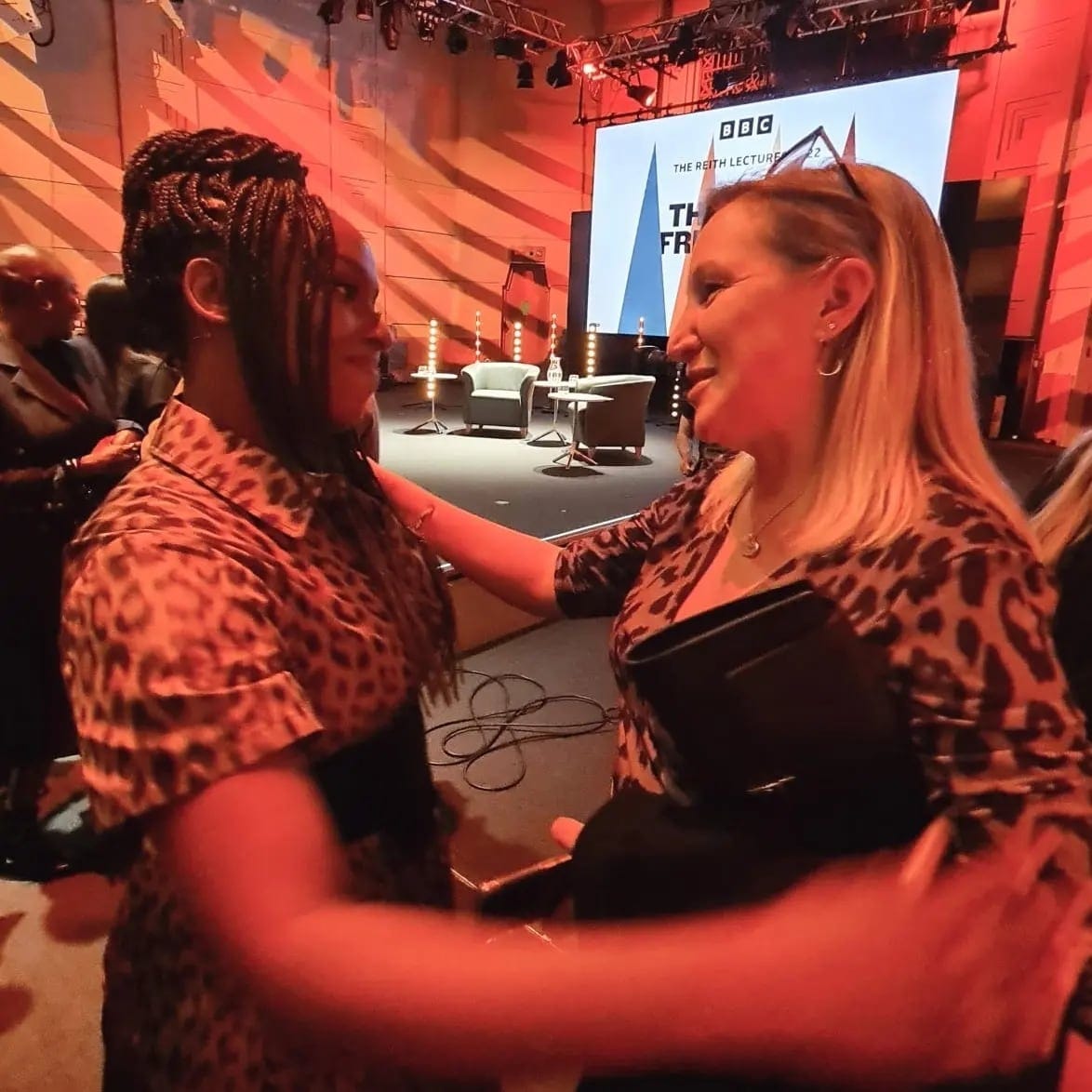Meeting an icon: Chimamanda Ngozi Adichie
Selfies, shoe goals and freedom of speech at her BBC Reith Lecture
A few weeks ago a mysterious email dropped into my inbox. Addressed directly to me, it was an invitation to attend a Reith Lecture at the BBC on Freedom of Speech, to be given by Chimananda Ngozi Adichie. My first reaction was, “Who me?!” - perhaps there had been some kind of mistake. My second reaction was for my heart to sink - the date was 31st October - not only a school night but Halloween, an occasion that for some reason my children invest in as enthusiastically as Easter and Christmas. Swanning off three hours away to London on such a date would not only leave my partner on a school run solo mission with three kids, but - for extra membership points in the Bad Mummy Club - my kids would be trick or treating without me. I didn’t think I could go.
But…hang on. This was Chimamanda. An icon. A living legend. A woman who had personally influenced me, not only through her beautiful essay and Ted talk, ‘We should all be feminists”…
…but…perhaps even more so, through her essay It is Obscene. I can still remember reading it, on my phone, parked in a car park about to go to a session in my local gym, which I had just joined. It was mid June 2021. Just a few weeks previously, Maya Forstater had won her case proving her gender critical beliefs were covered by the Equality Act. About a week after I sat in my car and read It is Obscene, the Royal Academy was forced to apologise to the artist Jess de Wahls. By July 10th, I had written and published my own story of cancel culture.
My gym membership was part of a recovery process for me after several months of deep depression brought on by both the pandemic and the horrendous online bullying I had experienced. Lifting weights, which I’ve become increasingly obsessed with in the past year or so, has made me feel stronger both physically and psychologically, but what’s also helped more than words could ever say is the courage of other women like Maya, Jess, and Chimamanda.
“There are many social-media-savvy people who are choking on sanctimony and lacking in compassion, who can fluidly pontificate on Twitter about kindness but are unable to actually show kindness”, Chimamanda writes. “People who ask you to ‘educate’ yourself while not having actually read any books themselves, while not being able to intelligently defend their own ideological positions, because by ‘educate,’ they actually mean ‘parrot what I say, flatten all nuance, wish away complexity.’…People who wield the words ‘violence’ and ‘weaponize’ like tarnished pitchforks. People who depend on obfuscation, who have no compassion for anybody genuinely curious or confused. Ask them a question and you are told that the answer is to repeat a mantra. Ask again for clarity and be accused of violence.”
If you read my essay and Chimamanda’s side by side you will see exactly how and why she spoke to me so deeply at that particular moment.
So - the Reith lecture on Freedom of Speech. I thought about it again, and realised I simply had to go. I asked the organisers if I could bring a friend, they said yes, and I knew exactly who I wanted to ask, a friend who I would never have met had I not spoken publicly about what happened to me, the fabulous Onjali Rauf. I asked her if I could sleep on her sofa if I took her to Chimamanda with me, and she practically exploded with excitement. For the few weeks prior to the event, we exchanged frantic and supercharged whatsapps like two teenagers on their way to a boyband.
By the time we arrived at the BBC we both agreed we were unsure if we were in a dream. We entered the building nervously and, to add to the suspense and mystery, I was told I was needed by a producer and taken into the empty radio theatre. “I hope you don’t think I’m giving the lecture”, I told her, and she laughed politely. She left me standing by the empty seats, about twenty of which were labelled with names, including my own. We were in a row: Milli Hill, Onjali Rauf, Lyse Doucet, Kathleen Stock. What WAS going on?!
Then in walked David Baddiel.
He and I stood together awkwardly in the empty theatre and I found myself spluttering away about how much I had loved the Mary Whitehouse Experience, and then thinking how flipping awful it must be to be David Baddiel and have some random woman congratulating you on a comedy sketch show you did 30 years ago, as if you hadn’t done much since. I tied myself up in further knots and he very kindly apologised for not bringing Rob Newman with him. It was all getting a bit awkward until we were rescued by the arrival of the producer, who asked us if we were all good to go with the questions we’d prepared.
Err, nope, I had not got that memo.
I bluffed along and said I absolutely 100% definitely could ask a question if needed and David Baddiel said he would ask one and then Kathleen Stock turned up and also seemed to know about the question thing. Eventually the situation fizzled out and I escaped to the drinks reception to find Onjali and do what I’d actually come to do - take over-excitable selfies.
Then it was back into the hall to take our assigned seats and ambush Kathleen and Lyse Doucet (who I excitedly told she was in a ‘Terf Sandwich’ - remind me never to speak to anyone famous again) with our enthusiasm.
And then…Chimamanda. I know she understands the inner conflict that being a fierce feminist and also caring about footwear can bring, so I’m going to go right ahead and say that she was wearing the most gorgeous animal print dress, unusual yet ultra cool belt and THE BOOTS. Oh my god, the boots.
I’m not going to break down her speech in this post. Perhaps when it is broadcast on Radio 4 at the end of November, I’ll write something more detailed about it then. For now suffice to say she took on this complex topic in the style you would expect from her - warm, nuanced, earthy, intelligent, humane. She gave particular focus to the complexities of our online lives, but was swift to condemn those who sit as judge and jury and unleash mob rule on others, ruining careers and lives in order to display their moral superiority.
Did I ask a question? No, I did not. I thought about it but decided I just wanted to soak it all up without the stress that comes before you ask your question, and without the potential anxiety that comes after: “why did I put it like that? why did I crack that stupid joke? why did my tongue stick to the roof of my mouth? why did I mention the terf sandwich?”, etc. This anxiety can be life-long and existential so I decided to give it a miss.
Of course now I’m having regrets that I didn’t pipe up. If I had, it would have been one of the following.
“Hi, I’m Milli Hill, a non-fiction author and someone who’s had personal experience of online attacks. Could you say a little bit about why you feel it’s predominantly women who seem to be on the receiving end of such attacks.”
OR
“Hi I’m Milli Hill, non-fiction blah-de-blah. In your talk you seem to offer the solution of staying away from social media almost completely in order to preserve your sanity and make the best use of a short life on earth. Can you tell us how you manage to keep your finger so clearly on the pulse, without wasting your life, as I do, on twitter?”
Anyway, I didn’t. Plenty of others did and that’s fine. And then. The unforgettable bit. After the lecture, Chimamanda came down to the side of the theatre to chat to people and Onjali and I decided to hang around and see what happened. Of course there were a lot of people wanting to talk to her. We hung back, and at one point someone from the BBC suggested she move down to the front of the stage where there was more space. We moved down to the space first, and somehow, miraculously, she also moved there, and suddenly, there we were, the three of us, in the relatively empty corner!
“Hello”, we said to her.
“Who are you?”, she asked politely.
“I’m Milli Hill”, I said to her.
And she said, “Milli Hill. I know that name.”
Of course, she was probably just being polite. But I went on to tell her, “Yes, I’m one of the ‘cancelled women’”, and she said, yes, she thought that she had read about what happened to me - and then she hugged me for goodness sake.
I live forever in Onjali's debt for snapping these pics.
After the hug - which I pretended to take in my stride but in actuality I’ll still be telling everyone about in my old people’s home in 40 years time - she and I and Onjali stood for a few minutes and shared some thoughts about the online mob. She was very concerned to ask if I was ‘alright’, and I said that I very much was - for one thing I would not have Onjali as a friend nor would I be stood at her Reith lecture had all of it not happened. Such a silver lining. I told her about the huge feminist support I’d received and how much powerful solidarity and backlash there was in the UK. Then we took a selfie.
Onjali and I then left and went to a nearby bar to process it all. In Onjali’s case this took tea and biscuits and in my case a large white wine and an extremely fancy cocktail. Later we put on witches hats and larked about. We went to bed after midnight but both of us had trouble sleeping, such were our gargantuan levels of excitement. All in all a very good day. Happy Samhain, fierce witches!
This post is free for all but do please consider becoming a paid subscriber to have access to all posts and to support me and keep me writing. Thank you!















Aww Milli - glad you had a great time, you deserved it! I’m really glad to have got to know you over the past two years (online counts, yes?) and you are not ‘wasting your time on Twitter’. This is the nation’s conversation, and there are not too many women looking at the whole genderist shit show from the birth & maternity world - you’re doing a damn fine job.
(And C’s boots…..❤️❤️❤️).
PS - I totally get the shoe thing going on... my first ‘career’ was to be in fashion after 3 years at Art College... 3 children intervened before I went into my 2nd career midwifery... and now writing.